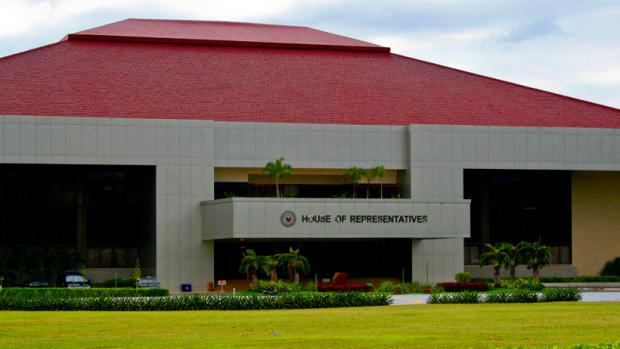Incoming Congress leadership shaping up

Facade of the House of Representatives (Photo from the Congress website)
Less than a week after the May 9 elections, certain lawmakers are being tipped to lead the 19th Congress.
Leyte Rep. Martin Romualdez, a cousin of presumptive president Ferdinand Marcos Jr., is seen as being in the best position to seek the speakership of the House of Representatives.
And in the upper chamber, Sen. Cynthia Villar and Senate Majority Leader Juan Miguel Zubiri are considered front-runners for the post of Senate president.
Romualdez, the outgoing House majority leader, is a close ally of Pampanga Rep. Gloria Macapagal-Arroyo, a former Speaker and former president, and herself touted as another contender for the speakership.
Reelected to a fifth term, Romualdez was described as a “consensus builder” by Camarines Sur Rep. Luis Raymund Villafuerte.
Article continues after this advertisement“The fact that he remained the majority leader even with the change in leadership in the House proves this,” Villafuerte said in a statement on Friday, referring to the tangled power-sharing arrangement between then Representatives Alan Peter Cayetano and Lord Allan Velasco, the current Speaker.
Article continues after this advertisement“He listens and values the opinions of his peers, whether from the majority or the minority,” Villafuerte said of Romualdez. “He has the ability to transcend the political divide to mobilize the House into action and pass the bills necessary to support Marcos’ development agenda.”
Institutional memory
The National Unity Party (NUP) has endorsed Romualdez – the campaign manager of presumptive vice president Sara Duterte in the recent elections — as the next speaker of the House. He has yet to comment on the endorsement.
He is a son of the late former ambassador and Leyte governor Benjamin Romualdez, the younger brother of former first lady Imelda Marcos.
According to Villafuerte, the NUP’s vice president for political affairs, Romualdez’s term as majority leader had “given him the institutional memory and wisdom to lead the House.”
He is “hard-working and gets things done quickly,” Villafuerte said, citing the record-speed passage of the two Bayanihan laws intended to ease the impact of the COVID-19 pandemic on the public.
Romualdez also helped accelerate the passage of the Corporate Recovery and Tax Incentives for Enterprises law, and amendments to the Retail Trade Liberalization Act, Public Service Act and the Foreign Investments Act, Villafuerte said.
Apart from being the government’s fourth highest official, the speaker of the House takes charge of the President’s legislative agenda in the chamber, including the yearly national budget.
Tone-setter
In the upper chamber, Sen. Aquilino Pimentel III said whoever got the vote as the next Senate president would set the tone of its future relationship with Malacañang.
“It is the vote on an issue which would show the general attitude of the Senate [toward the incoming administration],” he told the Inquirer on Friday.
Pimentel, who served as Senate president from 2016 to 2018, said it was too early to tell whether the chamber would be able to maintain its independence from the executive branch.
“Let’s see first. Let’s wait for the first critical vote to be cast in the Senate before we judge the institution’s capacity for ‘independence,’” he said.
Senate insiders said Villar, a leader of the Nacionalista Party that endorsed Marcos Jr.’s presidential candidacy, was the odds-on favorite to be Senate president because she enjoyed the support of his sister, Sen. Imee Marcos, also an NP member.
But a Senate source told the Inquirer that Zubiri was preferred by a number of his colleagues, including the so-called “Seatmates” bloc, for his consensus-building ability.
Senate President Vicente Sotto III, who will leave the chamber at the end of June, told reporters that his successor “must possess a mastery of parliamentary rules and procedures, a consensus builder, independent-minded, stern but compassionate,” and always present and never late.”
Qualifications, values
In a statement on Wednesday, Zubiri, who appears headed for reelection based on partial and unofficial results, said all talk about the Senate presidency was premature as the Commission on Elections had yet to proclaim the winners.
The election of the new Senate president “will be done in a democratic manner, based on qualifications and values that will uphold the traditions of the Senate as an institution,” Zubiri said.
“We have a bloc of almost a dozen independently elected senators and we look forward to working productively with the new administration for the good of the Filipino people,” he said.
READ: Robin Padilla still leads Senate race in Comelec’s second official report